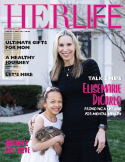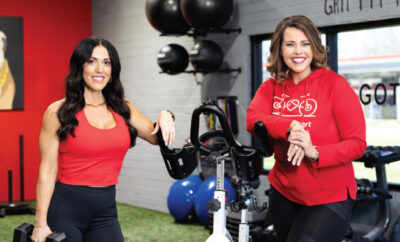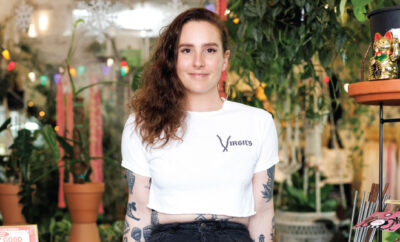 Amber Deery
Amber Deery
Helen Ortiz Turley: Making the American Dream a Reality
Life’s journey for Helen Ortiz Turley has progressed from being a “have not” to one who “has it all.” Three decades ago, the Lee’s Summit, Missouri, mother of three, was a near-penniless illegal immigrant from Guatemala, risking her life to make a new start in America. Her journey had many twists and turns but through determination and positivity, she achieved faith, family and fitness and developed a successful commercial real estate business. She now works with others new to this country, offering solid advice and encouragement.
“I tell them, ‘Don’t give up.’ Sure, that’s easy to say. But I think that more than anything you have to find your passion. What you’re good at. Once you know that, don’t stop at anything to get there,” advised Helen. “You can stumble but you just have to get up and dust yourself off and keep going.”
Three decades ago Helen was living in poverty with her son Dennis in Bananera, Guatemala, which is about eight hours south of Guatemala City. She was desperately poor with little chance of a better life. As she describes the situation, “There was no middle class. You were either rich or poor with little means to survive.” At age 17, she left her two-year-old with her mother and grandmother, and, with a close friend, escaped to America to try for a better life.
“It was the hardest thing I ever had to do. To this day, I remember his little face when we said goodbye. I didn’t know what my future would hold, what was going to happen and how long would I be away,” she shared. “It was extremely difficult and painful, but I knew I had to take that chance in order to give him a better future.” It took 12 years for Dennis and Helen to be reunited.
RIDING THE RAILS OF LA BESTIA
The plan the pair hatched to immigrate to America wasn’t well prepared because they had so little information. But they would follow others on the route, and there were many, moving to find better opportunities. Helen had only $80, but her friend had the ultimate prize, family in San Francisco, and they would try to connect with them. That was in April 1986.
The journey took them through jungles, deserts and unfamiliar cities and towns. The most terrifying part of the ordeal was hitching a ride on La Bestia, The Beast, also known as El Tren de la Muerte, The Train of Death. They would join hundreds of other immigrants and belt themselves onto the top of rail cars bringing cargo to the U.S. border. Each year about half a million migrants ride La Bestia, which has earned the name because many immigrants have been killed or lost limbs when they have fallen off and under the steel wheels of the freight cars.
“We couldn’t fall asleep because we needed to stay alert and help each other so we would take turns sleeping. We planned to stay on the train until Mexicali, but I got sick at Guadalajara. We hadn’t showered or had much water so I was feeling very ill. We decided to spend a few days and nights in a park,” she noted. “We survived through the help of strangers. There were a lot of good people on our road that helped us. They know who you are but they were good people. They gave us food and a little bit of money. Once I felt better and had sleep, we jumped back on the train for the rest of the journey.”
By June the pair finally made it to the border at Mexicali, stayed a few days and then crossed the border, marked by a barbed-wire fence. Hundreds of people stood along this barrier studying the ICE patrols. When the officers changed shifts, hundreds of migrants scaled the fence at once. With their vast numbers, some would make it but others would not be so lucky.
“When we got to the other side, I made it and hid in a building but my friend was caught. I watched her being placed in handcuffs. I was lost; I didn’t know where to go,” she remembered. “My first instinct was to surrender and give myself up, but the other side of me thought that I have made it this far and I have to finish this journey. I was hiding in this building and I didn’t realize it was a Pizza Hut. To this day, I love Pizza Hut.”
GOOD FORTUNES APPEAR
With her hopes diminished, fate once again assisted Helen on her journey. She had lost her contact in San Francisco with her friend’s arrest. But surprisingly she remembered that a school friend had given her the phone number of family in Los Angeles. She dug down into her purse and retrieved the small slip of paper. But how would she contact them? Once again good fortune was hers and the cook at the Pizza Hut let her stay at his family’s home and helped her reach out to her friends in L.A. A Greyhound bus ride brought her to the City of Angels, and contacts found her odd jobs to pay for food. But changes in the amnesty program for immigrants would require her to obtain a work permit, which she didn’t have. A “lawyer” said he would help her get this certification if she was willing to work in agriculture. That’s when she was human trafficked.
For an entire four-month season, every day from dusk to dawn, she worked for only room (sleeping 15 to 20 people in a motel room) and board (breakfast and dinner) picking strawberries in Patterson, California. “We were afraid we’d get caught, so we did what we had to do,” she recalled. At the end of the harvest, she was given a work letter, and in 1987, she received permission to work in the U.S. Each following year, she had an appointment at a U.S. Immigration and Customs Enforcement office to show that she worked and paid taxes, proving that she was a productive resident. Eight years later she became a permanent resident. During that timeframe, she got a job as a maid and became pregnant with her second son. She toiled with two or three jobs to make ends meet, but when her son was two, she met her husband, who hailed from Kansas City.
“And that’s how I got here. We were married for 20 years. He showed me that life could be better and for that, I’ll always be grateful,” she shared. “I learned English, and it was helpful that he was there to help me with that. And we had our daughter.”
Although the marriage ended, she found love again with her current partner of 20 years, Anthony Estrada, and she’s proud of her three children, Dennis, 39; Christian, 36; and Samantha, 30; and her eight grandchildren.
FROM NEGATIVITY TO POSITIVITY
The COVID pandemic caused her to lose her job, but she decided to reinvent herself and went into business by opening Carthage Commercial Real Estate with her son, Dennis. “I went to school to get my license for Kansas and Missouri and now I’m going to school to get my international license to sell real estate in Central America,” Helen commented. “I’m really focused on helping the Latino community, not only to sell them a building but also to educate them. I feel what holds us back is a lack of knowledge and education. When I speak to a client, I tell them we must have their finances in place to buy a restaurant or business. There are many people who are ready but don’t know how. I want them to have their dream come true just like I did mine.”
Not only is she a successful businesswoman, she is a multiple gold medalist in the International Fitness and Bodybuilding Federation, which provides a platform for both amateur and professional bodybuilders from around the world to compete. Her bodybuilding was interrupted by stomach cancer from 2009 to 2015, but treatments and surgeries were successful and she came back to qualify again for her professional certification for the sport.
MAKING IT HAPPEN
In most eyes, Helen has achieved the American dream with three decades of hard work and a willingness to never stop believing in her goals. She has successfully negotiated the journey of the “have nots” to those who “have it all.”
“America is great and people need to know that. It is the land of opportunities. You can set goals and you can dream and achieve your goals with hard work,” Helen remarked. “But for people already here, I say, ‘Don’t take things for granted.’ Many people don’t know what it’s like to go to another country and leave behind the life they know.”
The immigration issue can drive very different reactions no matter where you are in the U.S. Many want to construct walls to minimize the crossings, while others believe that a more humane solution can be developed. Helen offers that a compassionate answer must be found for those searching for a way out of poverty and the difficulties of trying to exist in a desperate environment.
“Someone who has never lived in a third-world country and endured poverty to that extreme needs to understand the reasons for that journey. Immigrants have left everything we know to try for something else, so put yourself in that situation. Would you take your family or leave them behind and go into the unknown? That’s a big decision,” she said. “America is great; I love this country, but I will always love my homeland. Sometimes migrants are good, bad or ugly. But nearly every one of these people makes these decisions out of intense need. I want others to understand the reasons and understand their journey and why they have to leave everything behind and come to this wonderful place.”












